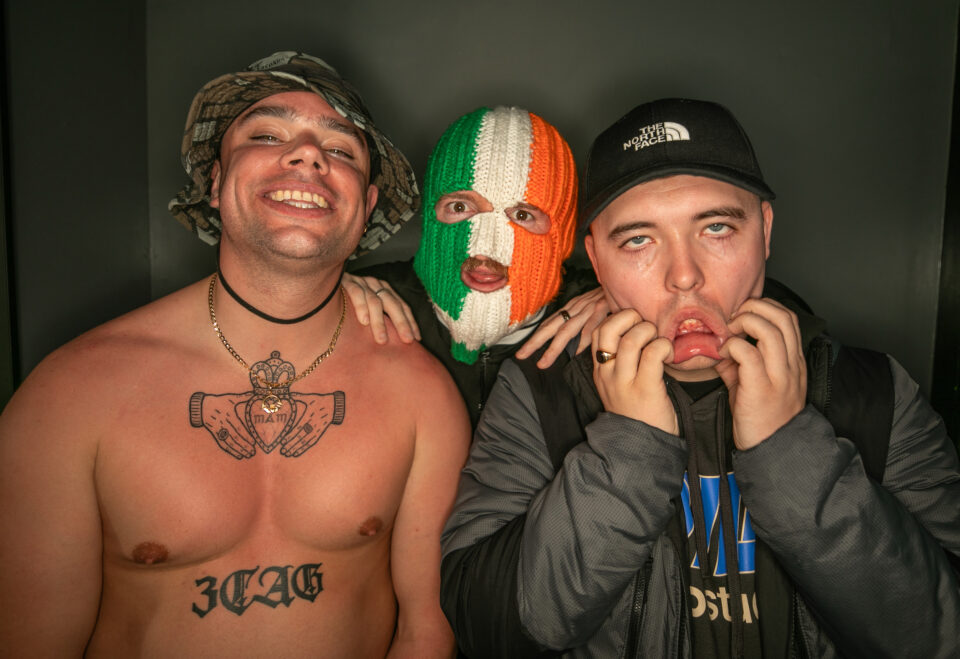Cancel the Irish hip-hop band’s US tour, like they did in Hungary
“Kneecap incites hate and violence, endorses terrorist organizations and promotes antisemitic messages," says Hungarian minister János Bóka.
By Virag Gulyas
JNS
Aug 12, 2025
Kneecap’s Liam Óg “Mo Chara” Ó hAnnaidh, JJ “DJ Próvaí” Ó Dochartaigh, and Naoise “Móglaí Bap” Ó Caireallain
As a native European, it can sometimes be
hard to find the fine line between hate speech and free speech under the
U.S. Constitution. Why is it considered free speech when someone burns
an Israeli flag in New York’s Washington Square Park during a Yom
Ha’atzmaut celebration? Why is chanting “Globalize the intifada”—a
slogan that openly calls for the murder of Jews worldwide—protected
under the First Amendment?
Questions about such blurred lines can
be raised about the Irish hip-hop band Kneecap, scheduled for a
multi-city tour this fall across the United States and Canada.
During their previous performance in April at the 2025 Coachella Valley Music and Arts Festival in Southern California, Kneecap projected the message “F**k Israel, Free Palestine” and encouraged the crowd to chant it. No matter how dangerous or disgusting people may find the group’s wording, technically, it falls under free speech.
Following their PR stunt, the group’s
booking sponsor, Independent Artist Group, withdrew its support. Without
a sponsor, Kneecap lost their artist visa, and with it, the legal
ability to perform in the United States. Reports indicate that they have
not obtained a new legal visa.
And yet, their concerts are scheduled, and many of them are sold out.
But
the issue runs deeper. Even before Coachella, videos surfaced of the
group saying, “Kill your local MP” (Member of Parliament), praising
Hamas and cheering for Hezbollah. They posted the images themselves in
case anyone questions the intentions of the group.
One of the
group’s members, who goes by the stage name Mo Chara, was charged with
terrorism in the United Kingdom in May after publicly displaying a
Hezbollah flag. The terrorist organization based in Lebanon is
officially designated as such in the United Kingdom and several other
countries, including the United States. And still, concerts are
scheduled.
Meanwhile, Hungary recently prevented the band from
entering its country. Kneecap had been invited to perform by the Sziget
Cultural Management Ltd., which organizes one of the largest festivals
in Eastern Europe. Despite grassroots and government pressure, the
company kept Kneecap on its lineup. That’s when the Hungarian government
stepped in and banned the group for three years, citing a serious
threat to national security.
János Bóka, minister for European
Union affairs of Hungary and the head of the official envoy to combat
antisemitism, who initially tried to resolve the matter privately with
the organizers, told me: “Kneecap incites hate and violence, endorses
terrorist organizations, and promotes antisemitic messages. We’ve
managed to keep these issues out of our country so far. I felt I needed
to take a clear stance to ensure it stays that way.”
Some defend
Kneecap’s slogans as a form of political expression. In reality, they
are coded calls to violence; in the United States, we’ve seen what
happens when such rhetoric is normalized. The young couple murdered in
Washington, D.C., were victims of online radicalization targeting Jews.
The 82-year-old Holocaust survivor killed in Boulder, Colo., while
attending a peaceful rally for Israeli hostages was another tragic
example of the normalization of Jew-hatred.
These calls aren’t
free speech but incitement to violence. And under Section 212 of the
U.S. Immigration and Nationality Act, the United States has every right
and legal authority to deny Kneecap’s re-entry.
Hungary said it
clearly: Foreign nationals do not have a constitutional right to enter
the country to incite violence. “Inviting Kneecap to festivals has
nothing to do with freedom of expression or legitimate political
debate,” Bóka said. “It is all about feeding the machinery of hatred and
making money in the process. At some point, one must say, ‘Enough. Not
here, and not under my watch.’ ”
Hungary may have taken the firmest stance, but it is not alone.
The
Eden Sessions in the United Kingdom canceled Kneecap’s planned
performance for July 4. A replacement show in Plymouth, England, was
canceled due to safety concerns raised by authorities. The Hurricane
& Southside festivals in Germany dropped Kneecap from its lineup in
April, along with other performances that had been scheduled in Cologne,
Berlin and Hamburg.
The TRNSMT Festival in Glasgow canceled
Kneecap’s mid-July concert after local police raised security concerns.
Recently, the city hosting
the Rock en Seine music festival in France withdrew its financial
support for the festival. Its official statement read: “We do not
finance political actions or demands, and certainly not calls to
violence, such as encouraging the killing of elected officials,
regardless of nationality.”
At this point, keeping Kneecap’s U.S.
tour on the calendar isn’t just poor judgment. Rather, it is a moral
failure—a case of political and civic irresponsibility.

No comments:
Post a Comment